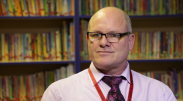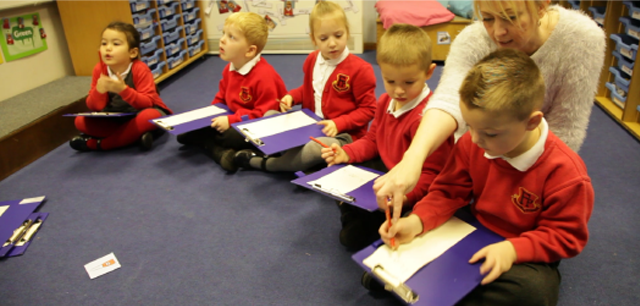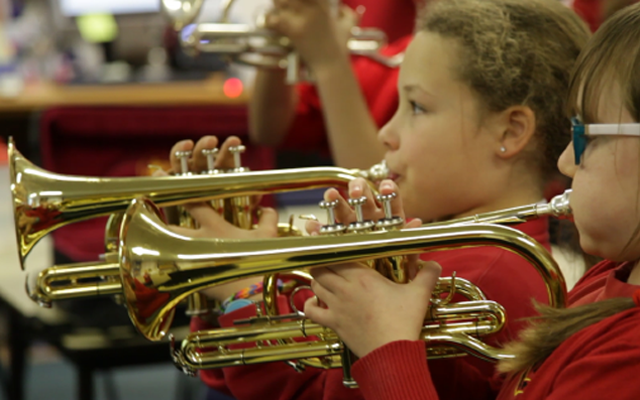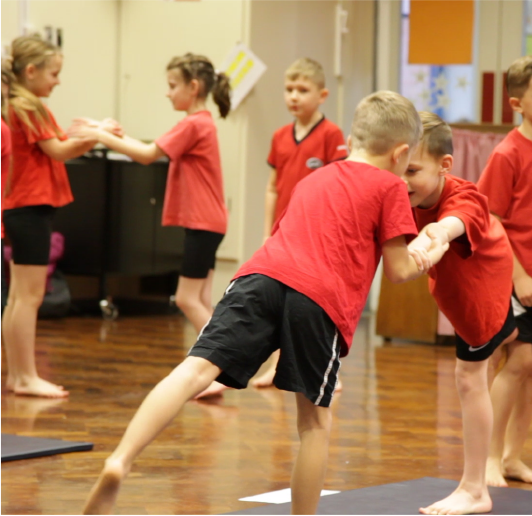Welcome to our Digital Prospectus.
Please navigate the pages by clicking or dragging the corner to view the content and take the opportunity to watch our videos.
Welcome
It is my pleasure to welcome you to our school’s digital prospectus. I am extremely proud to lead a team that is committed to achieving high standards and providing the very best opportunities for the children in our care.
Staff, supported by governors, work hard to deliver a rich and challenging curriculum; to prepare children for future education; and to help them acquire the skills and enthusiasm needed to pursue learning for the rest of their lives.
The best way to find out about our school is to come and visit, to see us in action and meet the staff and children. A telephone call to the school office on 01827 475778 is all that is needed to arrange this.
We look forward to welcoming you to our school, and to a happy and successful partnership with all our new children and families.

Headteacher
The Florendine Day
School starts at 8:55 am and registers are taken at 9:00 and we have started our learning by 9:05 am. We think that it is really important that we all get to school on time ready to start.
Please let the school know if your child is absent by contacting the school office by 9:15 am. We all have a morning break but the times are slightly different depending on which Key Stage you are in. Lunch starts at 12:00 for children in Foundation and Key Stage 1 and at 12:10 for those in Key Stage 2. Our afternoon learning starts at 1:05 pm.
The end of the school day is 3:10 for KS1 and 3:15 pm for KS2. Key Stage 1 Class teachers should be informed beforehand if someone else is collecting your child from school.
There are a range of after-school activities ranging from dance, Villa football training, athletics, gymnastics, art and homework, taking place each night after school.
‘We have a breakfast club that runs from 8:00 am each day, where the children can have a nutritious breakfast and take part in a range of activities before the school day begins’
The Florendine Look
Florendine uniform Boys
- Black/Grey shorts or trousers
- White shirt/polo shirt
- Red sweatshirt/cardigan
- Black shoes
For PE
- Plain red t shirt
- Black shorts
Florendine uniform Girls
- Black/Grey skirt or dress
- White shirt/polo shirt
- Red sweatshirt/cardigan
- Black shoes
- Red gingham dress
For PE
- Plain red t shirt
- Black shorts/leggings
‘We encourage our children to take pride in how they act, how they look and what they accomplish.’
The Florendine Way
At Florendine we aim to provide a welcoming environment and opportunities for children to become independent and active participants in their own learning.
We have high expectations of our children and ensure that they have the opportunity to achieve their full academic and social potential.
Our underpinning values remain;
- Enjoying school and achieving our potential.
- Making informed choices and doing the right thing.
- Facing challenges with confidence and learning from our mistakes.
- Working together to overcome problems.
- Working with independence, resilience and pride.
- Develop and demonstrate skills and attitudes that will allow them to participate fully in and contribute positively to life in modern Britain.

‘Our goal is to ensure each child has the chance to achieve their potential and to provide opportunities for them to develop as individuals.’

In this context, we aim to provide a curriculum which equips our children to meet the changing needs of their future and prepares them for their life as a responsible global citizen.
These are the values and beliefs that shape our common philosophy and approach in everything we do as a school.
We believe that all children have the potential to achieve great things and that we have a responsibility to instil in our children a sense of pride in who they are, how they act and what they accomplish. It is this responsibility that shapes the way we do things at Florendine.
The Florendine
Curriculum
The National Curriculum lies at the heart of what is taught at Florendine
It sets out a clear, full and statutory entitlement to learning for all children aged five to eleven and determines the content of what will be taught.
We have a great many adult helpers and work placements in school and we always welcome new volunteers.
It is preceded by the Early Years Foundation Stage Curriculum which is taught to children aged three to five.
‘Our strong emphasis on the basics of literacy and numeracy underpin all subjects within the curriculum. The curriculum itself is extremely varied and provides a broad and balanced approach supporting our over-riding aim of developing ‘well-rounded individuals’
Through a well-planned and organised curriculum, effectively taught by qualified and enthusiastic teachers, pupils are helped to:
- Develop the essential literacy and numeracy skills they need to learn.
- Develop the attitudes, understanding and skills to become successful, independent learners.
- Foster their creativity.
- Develop lively, enquiring minds.
- Develop personal values, qualities and attitudes and be respectful of other people and their views and opinions.
- Develop appreciation and concern for the environment.
- Work co-operatively with others.
- Work toward achieving their potential.
Physical Education
‘In our physical education programme we aim to promote our children’s health, physical development and confidence. The children experience a wide range of P.E. activities including dance, gymnastics, games, athletics and swimming.’
Physical Education plays a very important role at Florendine. Pupils experience a full program of activities in line with the national curriculum for KS1 and KS2. They also have numerous options to participate in a wide range of and afterschool sporting clubs and competitions.
Physical Education is concerned with the promotion of positive attitudes towards physical activity and well-being. At Florendine Primary children are helped to acquire the skills needed to participate with confidence and enjoyment in a range of individual team activities at school and in the wider community, and to appreciate the place of regular exercise as a way of keeping fit.
All children take part in a minimum of 2 hours of high quality PE and sporting activities each week provided by class teachers and/or a professional sports coach.
A well-balanced programme of sporting activities is provided for the children that includes opportunities for expressive and creative movement through dance, as well as gymnastics, swimming, athletics, games and outdoor and adventurous pursuits. Learning through co-operative and competitive activities helps to promote an understanding of inter-personal relationships.
Performing Arts
& Music
All Children are provided with the opportunity to explore and develop their own ideas through music.
The teaching of music is based on three elements: Listening, Composing and Performing. Participation and enjoyment play an important part of the musical curriculum.
From an early age children participate in a wide variety of musical appreciation from our own and other cultures.
‘The personal development and well-being children is of paramount importance.
The relationships that exist between pupils and their peers, and between pupils and staff, are essential in fostering a happy learning environment.’
From the ‘Gifted and Talented’ to those requiring support from our dedicated special needs teacher, all children are valued and have a right to the first class education that is provided here at Pennine Way. We are recognised in particular for the work we do in the area of ‘Special Educational Needs’.
A variety of peripatetic music teachers are in school each week to teach groups of KS2 children. Each child in Key Stage has their own instrument provided either string (in Y3/4) brass (inY5/6) and they have a whole class lesson each week.
The children are then able to take the instrument home to practise further if they wish. In addition all of our Year 2 children receive a weekly lesson on the recorder.

Early years at Florendine
In the Reception Year, the curriculum is planned and resourced to take children’s learning forward and to provide opportunities for all children to succeed in an atmosphere of care and of feeling valued.
The curriculum for the Foundation Stage is designed to ignite children’s curiosity and enthusiasm for learning, and to build their capacity to learn, form relationships and thrive. The curriculum is planned in seven areas of learning and development; all areas are important and inter-connected. There are three prime areas which are:
- Communication and Language Development involves giving children opportunities to experience a rich language environment; to develop their confidence and skills in expressing themselves; and to speak and listen in a range of situations.
- Physical Development involves providing opportunities for young children to be active and interactive; and to develop their co-ordination, control, and movement. Children must also be helped to understand the importance of physical activity, and to make healthy choices in relation to food.
- Personal, Social and Emotional Development involves helping children to develop a positive sense of themselves, and others; to form positive relationships and develop respect for others; to develop social skills and learn how to manage their feelings; to understand appropriate behaviour in groups; and to have confidence in their own abilities.
Four Specific areas strengthen the three prime areas:
- Literacy Development involves encouraging children to link sounds and letters and to begin to read and write. Children must be given access to a wide range of reading materials.
- Mathematics involves providing children with opportunities to develop and improve their skills in counting, understanding and using numbers, calculating simple addition and subtraction problems; and to describe shapes, spaces, and measures.
- Understanding the World involves guiding children to make sense of their physical world and their community through opportunities to explore, observe and find out about people, places, technology and the environment.
- Expressive Arts and Design involves enabling children to explore and play with a wide range of media and materials, as well as providing opportunities and encouragement for sharing their thoughts, ideas and feelings through a variety of activities in art, music, movement, dance, role-play, and design and technology.
Parents
From the outset we want to work in partnership with parents to secure the best possible outcomes for all the pupils at our school.
We have an open door policy and a caring and supportive staff who are always willing to find the time to discuss any aspect of your child’s time at school.
Our school website provides links to learning resources along with useful information about what is covered in each year, what topics are going to be covered and what is expected with regards to the new national curriculum. Each pupil’s progress and attainment are shared with parents each term and consultation evenings
‘I trust the staff at Florendine .I know that they have my child’s best interests at heart. They will always make the time to talk through any of my concerns. I couldn’t ask for more than that!’ Parent Quote
Pupil Voice
Members of the classes are elected by their classmates to serve on the School Council.
This introduction to the democratic process is fundamental to their developing understanding of one of the fundamental values that we cherish.
These children, together with a staff representative form a committee, which meets to discuss all aspects of school life. The Councillors bring forward ideas and suggestions which come from the main pupil body.
We value the ideas and opinions of the children, which gives us the opportunity to see things from a different perspective. The council has become an important aspect of school life. It gives the children the opportunity to become more involved in the decision making process. They are becoming more independent and are starting to take ownership of improvements made in school.
‘Democracy is all about having your say. We can ask our school councillor to speak for us at meetings. They can get new things or change the way we do things and make school better for all of us!’ Pupil Quote





























